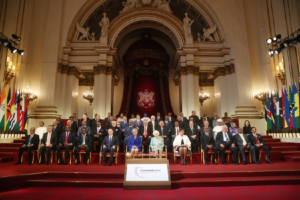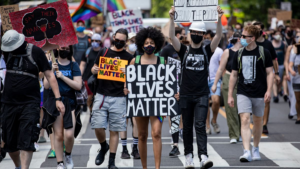By Professor Philip Murphy, Director of ICwS
The 2020 Commonwealth Heads of Government Meeting (CHOGM) was due to open in Rwanda on 22 June. In April, with only a couple of months to go, the inevitable announcement was made that the summit was being postponed to some unspecified date due to COVID-19. The Rwandan government, which had invested significantly in preparing its capital, Kigali, to host the event, clearly did not want to give up what it hoped would be the economic rewards of doing so. This may explain both the delay in announcing the postponement, and the Secretariat’s insistence that, when safe to do so, leaders would meet in Rwanda as planned.
 At the very least, the biennial CHOGMs tend to raise the public visibility of the Commonwealth and spark debates in the press about its direction and purpose. With no plans on the part of the Secretariat to hold any alternative events online, there was a significant gap in the diaries of Commonwealth-related organisations. In the meantime, media attention focused on the growing rift between the British government and the Commonwealth Secretary-General, Patricia Scotland. If and when heads do finally convene in Rwanda, it seems likely that their deliberations will be dominated by the question of the future of Scotland and her possible successor. Every previous CHOGM in the past decade has seen attention focused inwards on the Commonwealth’s internal processes and leadership (or even, in 2013, on the location of its meeting) rather than on an imaginative, outward-facing agenda. And it seems likely that the 2021 summit will follow that pattern.
At the very least, the biennial CHOGMs tend to raise the public visibility of the Commonwealth and spark debates in the press about its direction and purpose. With no plans on the part of the Secretariat to hold any alternative events online, there was a significant gap in the diaries of Commonwealth-related organisations. In the meantime, media attention focused on the growing rift between the British government and the Commonwealth Secretary-General, Patricia Scotland. If and when heads do finally convene in Rwanda, it seems likely that their deliberations will be dominated by the question of the future of Scotland and her possible successor. Every previous CHOGM in the past decade has seen attention focused inwards on the Commonwealth’s internal processes and leadership (or even, in 2013, on the location of its meeting) rather than on an imaginative, outward-facing agenda. And it seems likely that the 2021 summit will follow that pattern.
Here at the Institute, we are keen to explore ways in which the Commonwealth can be reimagined and reinvigorated. At the same time, we had responded to the global pandemic by taking a series of our own events online, including workshops on Decolonization and Commonwealth History. It quickly became clear that there was a strong appetite for these forums, and that technology provided us with new opportunities to link participants from across the globe. We therefore came up with the idea of holding our own, entirely unofficial online conference on the current state of the Commonwealth on Wednesday 24 June, in the middle of what would have been the week of the CHOGM. Running from 8.00 am to 8.00pm BST, its 12 hour duration would allow us to work across time zones, spanning the entire Commonwealth from New Zealand to Canada and the Caribbean.
The unofficial nature of the conference offered us a chance to work ‘against the grain” of the official Commonwealth. As well as being inward-looking in terms of their substantive business, CHOGMs have become notorious for their lengthy final communiques covering an impossibly wide range of worthy sentiments. At the same time, the inter-governmental Commonwealth has tended to avoid addressing something that almost all its members have shared experience of – the complex and often poisonous legacies of the British empire. By contrast, this was the key area our conference sought to explore. It considered attempts to overturn colonial-era laws criminalising homosexuality, and campaigns to obtain reparations for slavery and colonial Human Rights abuses. We were delighted to have leading experts to discuss these issues, including Professor Sir Hilary Beckles, the Vice-Chancellor of the University of the West Indies and author of a major study of the reparations question. And because there are resemblances in parliamentary systems and laws governing the press, the Commonwealth also provides a fascinating comparative basis on which to study contemporary threats to democracy and media freedom in the world, the subject of two separate panels of our conference.
The last commonwealth heads of government, which took place in London in April 2018 was overshadowed by the Windrush scandal. The recent ‘Black Lives Matter’ protests across the world, have brought the issue of the marginalisation of BAME people back into the limelight. We felt it was appropriate that we should revisit the Windrush scandal, and we were delighted to be joined by Amelia Gentleman of the Guardian and the Revd Ambassador Guy Hewitt, the High Commissioner of Barbados to London, who together played a leading role in shaming the British government over its handling of the affair at the time of the 2018 summit. The panel was expertly chaired by Dr Juanita Cox, who has been conducting oral history research at the Institute on issues related to Windrush.
And did this ambitious plan work? Well the recordings of the six panels are being made available on the Institute’s website, so it will be possible to judge for yourself. Technically, from our first extremely lively panel discussion on the global impact of COVID-19 between Professor Robert Patman at the University of Otago in New Zealand, Professor Pratap Bhanu Mehta in New Delhi, Dr Suan Ee Ong in Singapore and Sharon Memis of the ACU in London, we succeeded in connecting a remarkable range of speakers from around the Commonwealth. Given the logistical challenges, this was a significant achievement in itself. But more importantly, the standard of each panel discussion was outstandingly high. Notably absent were the platitudes and empty rhetoric which too often characterise Commonwealth discussions. Instead, there was an urgency and passion to the debates. The panels on Windrush and LGBT+ rights were masterclasses in how Commonwealth summits can be utilised by non-governmental activists to promote their agendas. And those on threats to democracy and media freedom pointed to the fact that, increasingly, those threats come from the elected leaders of Commonwealth member states themselves.
Too often, when we talk about ‘the Commonwealth’ we actually mean the inter-governmental Commonwealth coordinated by the Secretariat. And viewed in that perspective, it is hardly surprising that many have come to view the Commonwealth as a spent force. Yet our conference on 24 June was a reminder that, throughout its history, which stretches back far beyond the creation of the Secretariat in 1965, there have always been other Commonwealth networks, sometimes employed for the purposes of protest and opposition. In the current circumstances, against the background of the Black Lives Matter protests and a renewed interest in the legacies of Empire, our conference suggested that it is time to revisit those alternative histories of the Commonwealth and perhaps reawaken a focus and energy that has been sorely lacking at inter-governmental level.


Recent Comments